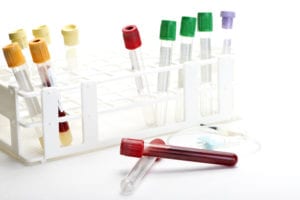Written by Joyce Smith, BS. Short term supplementation with reduced coenzyme Q10 significantly improved markers related to inflammation and thrombosis in patients with Antiphospholipid Syndrome.
 Antiphospholipid syndrome (APS) is an acquired autoimmune disorder that manifests clinically as recurrent venous or arterial thrombosis that can lead to heart attack, stroke, pulmonary embolism or miscarriages and other pregnancy complications and/or fetal death. The presence of antiphospholipid antibodies (antibodies to certain fats) in the blood is also associated with migraine headaches, and low blood platelet counts (thrombocytopenia).1
Antiphospholipid syndrome (APS) is an acquired autoimmune disorder that manifests clinically as recurrent venous or arterial thrombosis that can lead to heart attack, stroke, pulmonary embolism or miscarriages and other pregnancy complications and/or fetal death. The presence of antiphospholipid antibodies (antibodies to certain fats) in the blood is also associated with migraine headaches, and low blood platelet counts (thrombocytopenia).1
Supplementation with CoQ10 has been shown to reduce the risk of cardiovascular disease by inhibiting LDL oxidation, and decreasing the production of proinflammatory cytokines and blood viscosity 2-4 . When given alone or in combination therapies, its benefits on renal 5 and metabolic diseases 6 are also evident; however, more studies are needed in auto-immune associated CVD. A 2012 study by Perez-Sanchez et al demonstrated that in vitro treatment with CoQ10 reduced oxidative stress and improved the mitochondrial dysfunction and prothrombotic status of patients with APS induced by antiphospholipid antibodies (aPLs) 7 . To explore further their work, they designed the following prospective, randomized, double-blind, placebo-controlled crossover trial 8 to analyze in vivo the short term effects of reduced coenzyme Q10 (Q red) on thrombosis-related markers in antiphospholipid syndrome.
Thirty-six patients fulfilling the classification criteria for APS1 were randomized to receive for one month either Q red, a reduced form of coenzyme Q10, or a placebo with a 4 week washout period between treatment groups. Analyzed data, collected at four monthly visits, revealed that by decreasing peroxides and damaged mitochondria in monocytes and by modulating atherosclerosis-related genes and microRNAs, Q red supplementation was able to significantly reduce the expression of several prothombotic parameters in patients with APS. Specifically, supplementation with Q red did the following:
- Significantly reduced oxidative status and mitochondrial dysfunction (reduced peroxides and the number of monocytes with altered mitochondrial function); increased glutathione P<0.05); significantly increased plasma antioxidant capacity (P<0.05), and decreased plasma LDL (P<0.05) compared to placebo.
- Promoted significant changes in mitochondrial ultrastructure and biogenesis (increased the mitochondrial size in monocytes and the number of genes participating in mitochondrial biogenesis)
- Improved the prothrombotic and inflammatory status of patients with APS
- Prevented the activation of several intracellular kinases involved in thrombosis and inflammation in monocytes from patients with APS
- Prevented Enosis (a form of cell death) in patients with AP
This study with its randomized cross over design is strengthened by the fact that all participants who received Q red also functioned as their own controls, lending credence to the fact that the observed effects are due to the supplementation of Q red.
Based on the above stated findings, and in the absence of significant side effects, the researchers suggest that supplementation with Q red may be a potentially safe adjunct to existing therapies in APS patients. However, it should be noted that CoQ10 is not a medication and should not be a substitute for medical care especially where anticoagulants are concerned. Pregnant women with antiphospholipid syndrome should consult with their OB/GYNE before using this product.
Source: Pérez-Sánchez, Carlos, María Ángeles Aguirre, Patricia Ruiz-Limón, María Carmen Ábalos-Aguilera, Yolanda Jiménez-Gómez, Iván Arias-de la Rosa, Antonio Rodriguez-Ariza et al. “Ubiquinol effects on antiphospholipid syndrome prothrombotic profile: a randomized, placebo-controlled trial.” Arteriosclerosis, thrombosis, and vascular biology (2017): ATVBAHA-117.
Copyright © 2017 American Heart Association, Inc. All rights reserved.
Posted January 7, 2019.
Joyce Smith, BS, is a degreed laboratory technologist. She received her bachelor of arts with a major in Chemistry and a minor in Biology from the University of Saskatchewan and her internship through the University of Saskatchewan College of Medicine and the Royal University Hospital in Saskatoon, Saskatchewan. She currently resides in Bloomingdale, IL.
References:
- NIH. Antiphospholipid Antibody Syndrome. https://www.nhlbi.nih.gov/health-topics/antiphospholipid-antibody-syndrome. Accessed January 03, 2019.
- Villalba JM, Parrado C, Santos-Gonzalez M, Alcain FJ. Therapeutic use of coenzyme Q10 and coenzyme Q10-related compounds and formulations. Expert opinion on investigational drugs. 2010;19(4):535-554.
- Turunen M, Olsson J, Dallner G. Metabolism and function of coenzyme Q. Biochimica et Biophysica Acta (BBA)-Biomembranes. 2004;1660(1):171-199.
- Littarru GP, Tiano L. Clinical aspects of coenzyme Q10: an update. Nutrition. 2010;26(3):250-254.
- Rivara MB, Yeung CK, Robinson-Cohen C, et al. Effect of coenzyme Q10 on biomarkers of oxidative stress and cardiac function in hemodialysis patients: the CoQ10 biomarker trial. American Journal of Kidney Diseases. 2017;69(3):389-399.
- Raygan F1 RZ, Dadkhah Tehrani S2, Farrokhian A1, Asemi Z3. The effects of coenzyme Q10 administration on glucose homeostasis parameters, lipid profiles, biomarkers of inflammation and oxidative stress in patients with metabolic syndrome. Eur J Nutr. 2016;55(8):2357-2364.
- Perez-Sanchez C, Ruiz-Limon P, Aguirre MA, et al. Mitochondrial dysfunction in antiphospholipid syndrome: implications in the pathogenesis of the disease and effects of coenzyme Q10 treatment. Blood. 2012:blood-2011-2012-400986.
- Pérez-Sánchez C, Aguirre MÁ, Ruiz-Limón P, et al. Ubiquinol effects on antiphospholipid syndrome prothrombotic profile: a randomized, placebo-controlled trial. Arteriosclerosis, thrombosis, and vascular biology. 2017:ATVBAHA. 117.309225.
